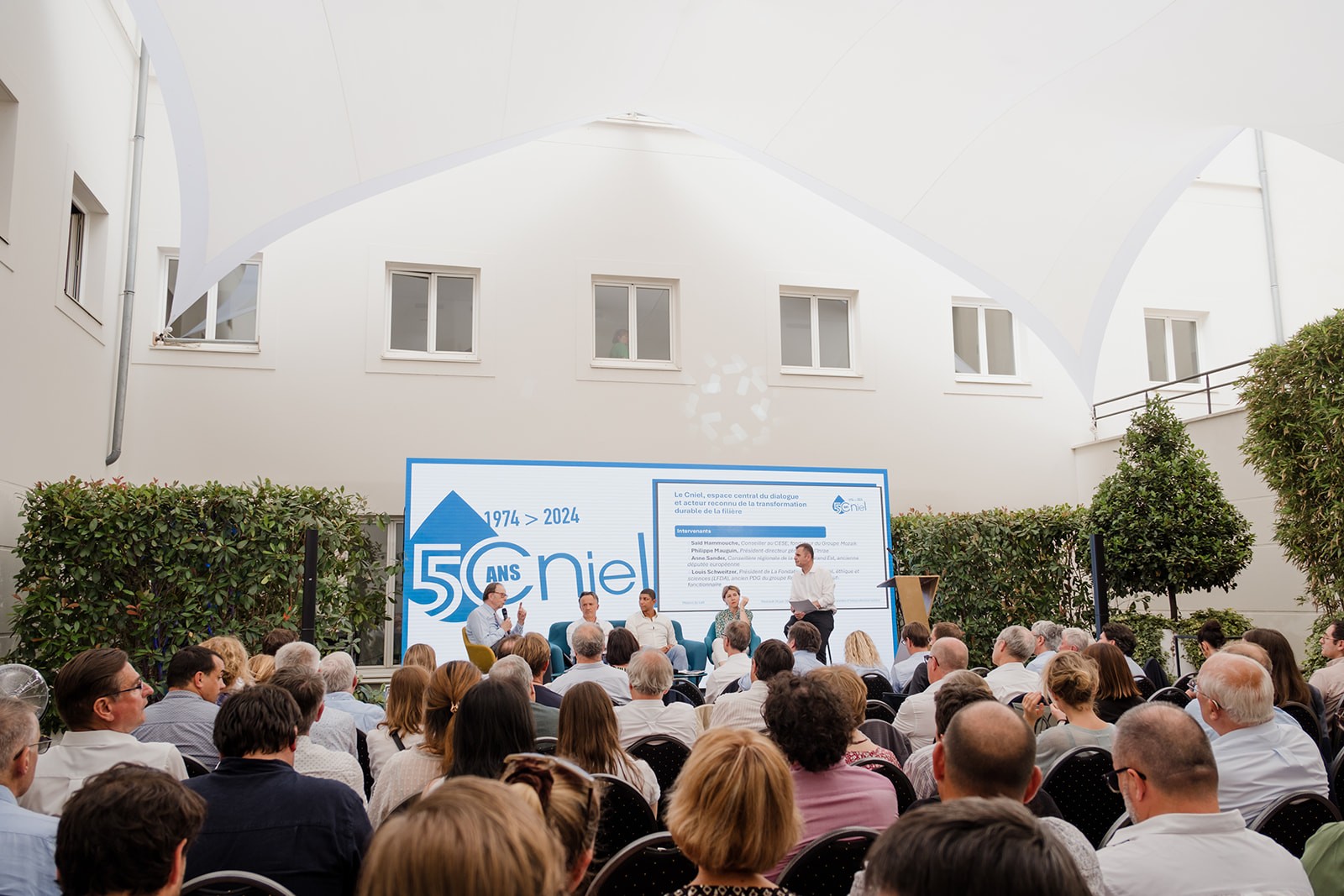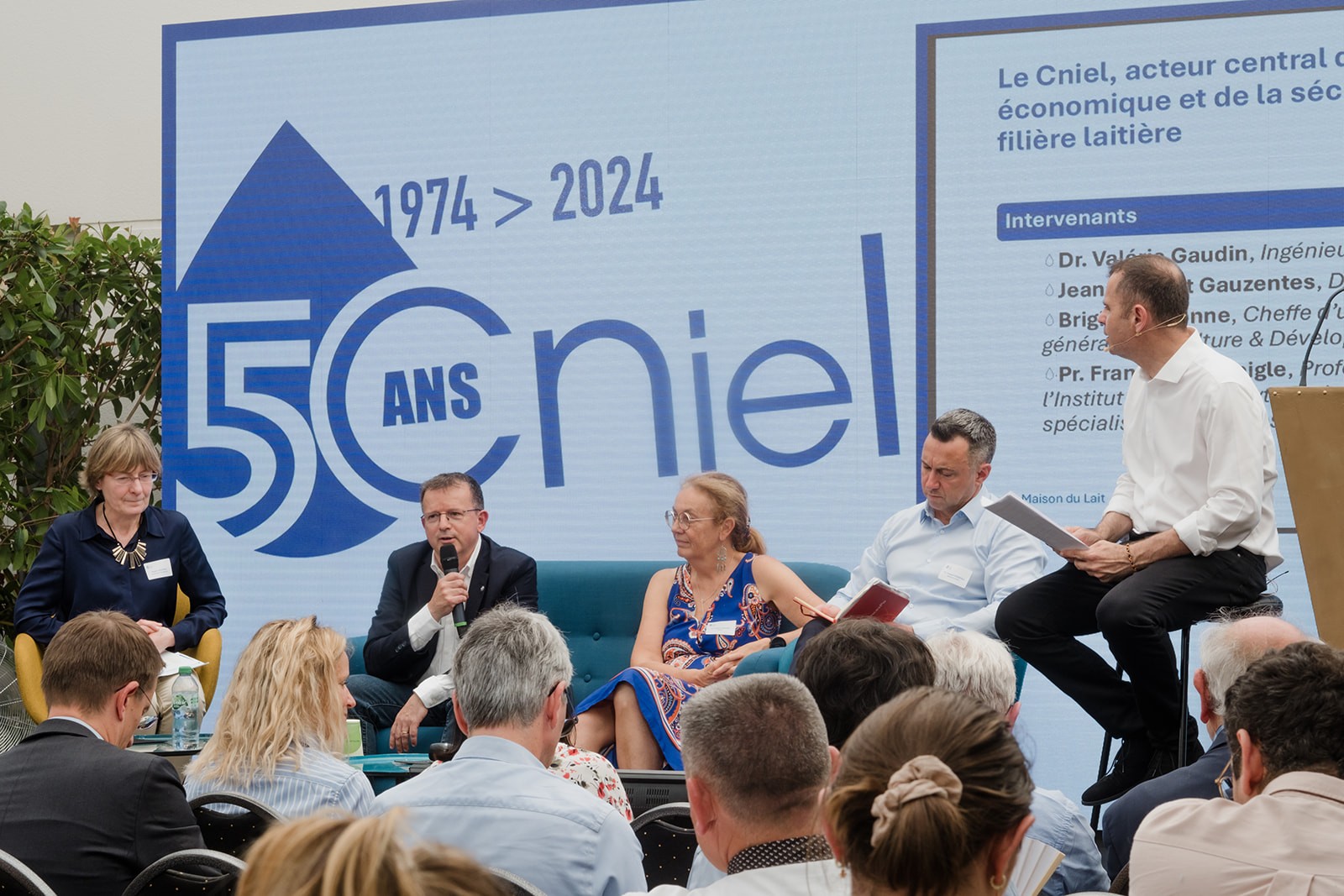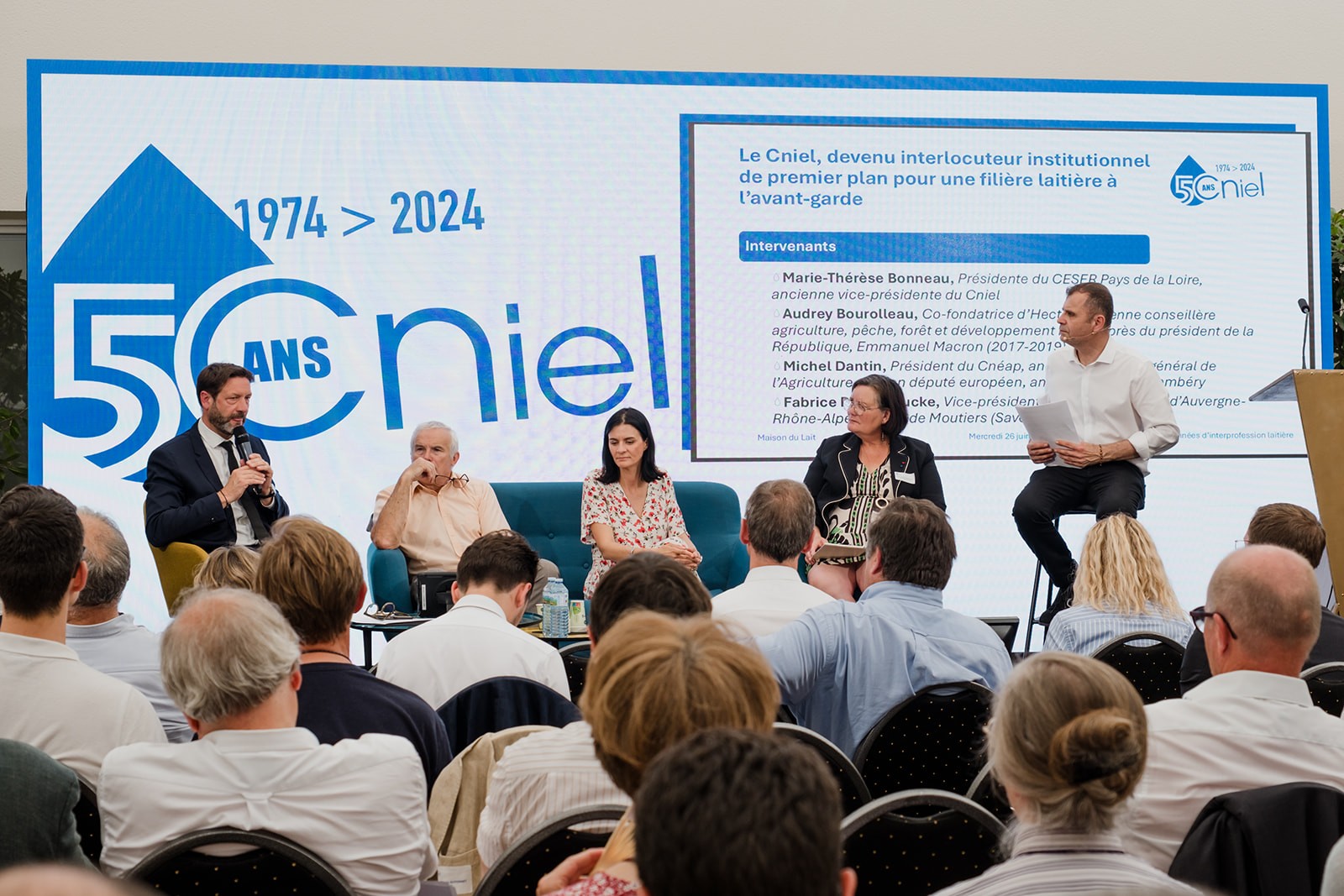
Cniel, a leading institutional partner for a cutting-edge dairy sector
As the French Interprofessional Centre for the Dairy Economy (in French, the Centre National Interprofessionnel de l’Économie Laitière, more commonly referred to as the Cniel) celebrates its 50th anniversary, it is evident that the organisation is more than ever a key institutional actor. Active at regional, national and European level, Cniel is involved in economic, health and environmental issues, making the interprofessional organisation an essential pillar in the development and sustainability of the dairy sector.Cniel, the historic driving force behind the dairy sector
Established in 1974 , Cniel was created to unite the players in the French dairy sector, with the initial role of mediator between milk producers, processors and distributors to ensure effective coordination within the sector. Since then, Cniel has continued to expand and strengthen its role. At the outset , Cniel was largely called upon to arbitrate disputes and support the sector in administrative procedures, but over time it has become increasingly dynamic and proactive, initiating innovative projects and playing a key role in the development of public policies.
Marie-Thérèse Bonneau, former vice-president of Cniel and current president of CESER Pays de la Loire, sums up the evolution: « Cniel has always taken the initiative. At one time we went to the public authorities to explain the incentives that brought us together and the elements that characterised us, and asked for support to keep these things alive. From there, we moved to a different dynamic as a proactive force, with the establishment of the France Terre de Lait project, a progress initiative with established indicators for monitoring.» Cniel’s relations with the public authorities have gradually strengthened from occasional consultations to a crucial role in defining and implementing agricultural policies in France.
Marie-Thérèse Bonneau, former vice-president of Cniel and current president of CESER Pays de la Loire, sums up the evolution: « Cniel has always taken the initiative. At one time we went to the public authorities to explain the incentives that brought us together and the elements that characterised us, and asked for support to keep these things alive. From there, we moved to a different dynamic as a proactive force, with the establishment of the France Terre de Lait project, a progress initiative with established indicators for monitoring.» Cniel’s relations with the public authorities have gradually strengthened from occasional consultations to a crucial role in defining and implementing agricultural policies in France.
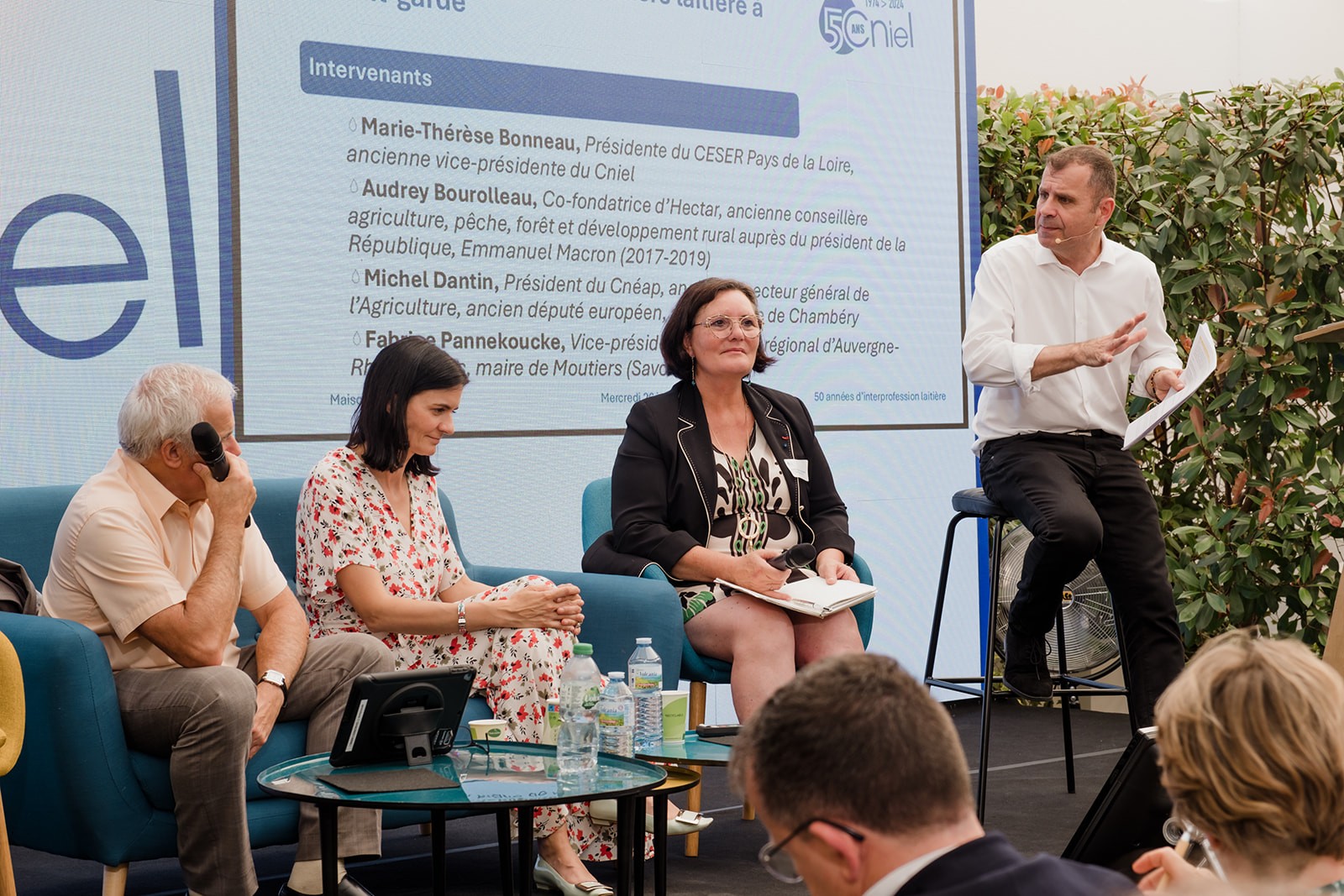 Guillaume Blanchon
Guillaume BlanchonÉtats Généraux de l’Alimentation : the origins of France Terre de Lait
One of the key moments in this evolution was the participation of Cniel in the États Généraux de l’Alimentation consultation launched in July 2017 by the French government to reform agricultural and food practices. “This initiative marked a turning point in the recognition of Cniel as a key actor in the agricultural and food sector,” recalls Marie-Thérèse Bonneau. « We were a little envied at the time: we were talking about milk in practically every workshop!»
At the close of the États Généraux consultation in December 2017, President Emmanuel Macron asked each sector of agricultural to present a five-year sector plan. This request was the catalyst for the creation of the France Terre de Lait approach, aimed at promoting sustainable agriculture while enhancing the value of French dairy products.
At the close of the États Généraux consultation in December 2017, President Emmanuel Macron asked each sector of agricultural to present a five-year sector plan. This request was the catalyst for the creation of the France Terre de Lait approach, aimed at promoting sustainable agriculture while enhancing the value of French dairy products.
From national to local
In line with the active participation of Cniel in the Etats Généraux de l’Alimentation, which highlighted the specific challenges facing the dairy sector and helped inform political decisions, Cniel maintains regular interaction with government ministries to defend the interests of the various actors in the dairy sector and support initiatives to meet today’s challenges. The progress initiative and sustainable development projects supported by Cniel are concrete examples of this fruitful collaboration. These initiatives aim to improve the sector’s competitiveness while meeting societal expectations around sustainability and quality.
In addition to its national actions, Cniel also plays a crucial role at local and regional level, by way of its CRIEL regional interprofessional bodies. « When we talk about the sector and the interprofession at the upstream and downstream levels, we’re talking about a wide variety of audiences. We can’t send out a single message in one fell swoop, otherwise very few people will receive it, «explains Fabrice Pannekoucke, Vice-Chair of the Auvergne Rhône-Alpes Regional Council. But thanks to local representation, via the regional representation of the CRIELs, we can reach all targets. And if we’re able to deliver messages to each of the actors, it means we are able to get the different actors and partners around the same table. Building a plan for the sector involves being able, at some point, to sit at the same table to understand each other and discuss the difficulties and challenges!» By offering a decentralised approach, the CRIELs are able to take into account local particularities, and thus respond to the specific needs of each region. The Auvergne Rhône-Alpes region, for example, is working with the European Agricultural Fund for Rural Development (EAFRD) to develop a specific sector plan involving 10 million euros over 5 years.
In addition to its national actions, Cniel also plays a crucial role at local and regional level, by way of its CRIEL regional interprofessional bodies. « When we talk about the sector and the interprofession at the upstream and downstream levels, we’re talking about a wide variety of audiences. We can’t send out a single message in one fell swoop, otherwise very few people will receive it, «explains Fabrice Pannekoucke, Vice-Chair of the Auvergne Rhône-Alpes Regional Council. But thanks to local representation, via the regional representation of the CRIELs, we can reach all targets. And if we’re able to deliver messages to each of the actors, it means we are able to get the different actors and partners around the same table. Building a plan for the sector involves being able, at some point, to sit at the same table to understand each other and discuss the difficulties and challenges!» By offering a decentralised approach, the CRIELs are able to take into account local particularities, and thus respond to the specific needs of each region. The Auvergne Rhône-Alpes region, for example, is working with the European Agricultural Fund for Rural Development (EAFRD) to develop a specific sector plan involving 10 million euros over 5 years.
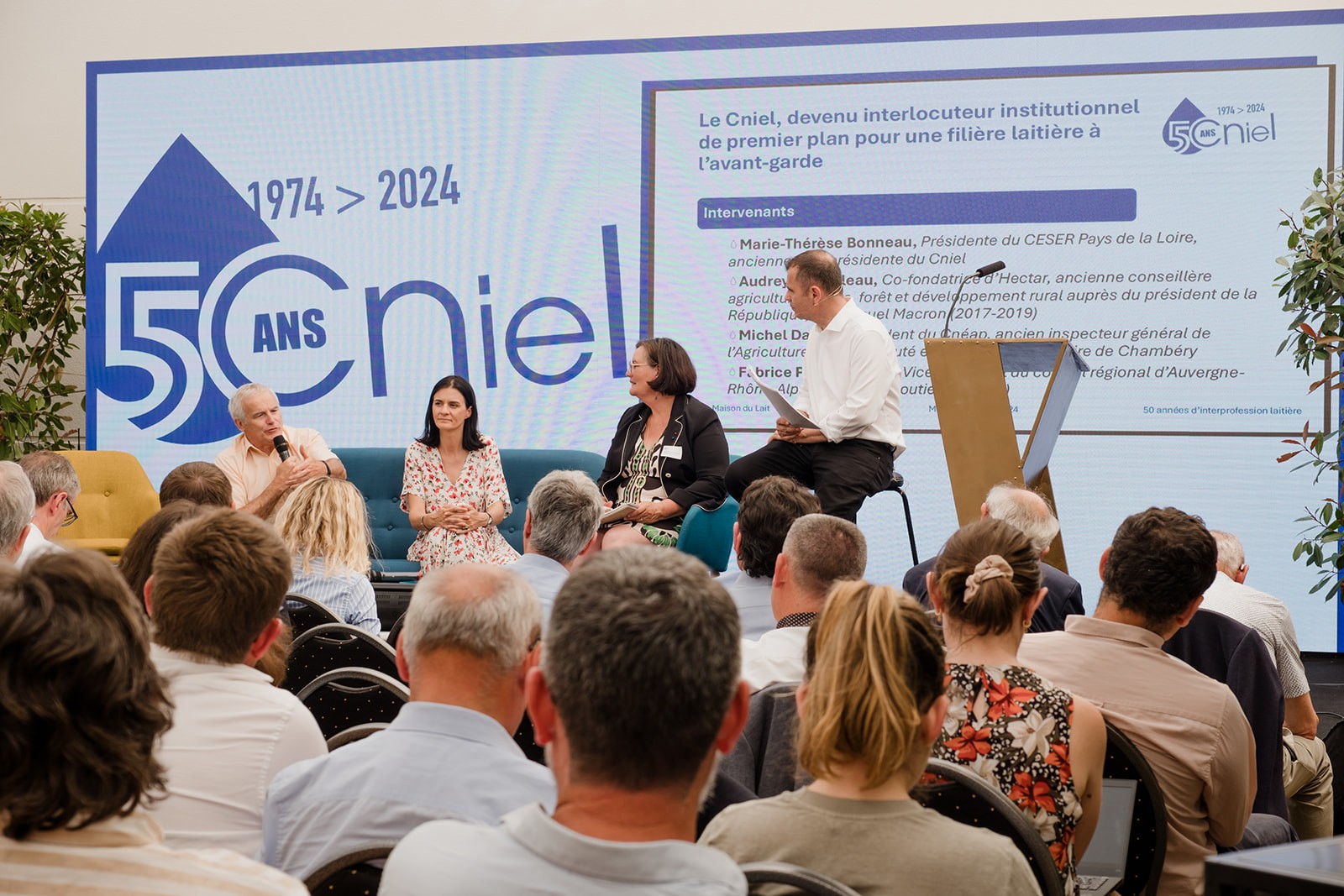 Guillaume Blanchon
Guillaume BlanchonEuropean level
Cniel also plays an important and multifaceted role at the European level, defending the specific interests of the French dairy sector, contributing to the development of common agricultural policies, and promoting an interprofessional management model.
One of the major contributions of Cniel at European level concerns its involvement in the common organisation of the agricultural markets (CMO), the European regulatory framework designed to stabilise agricultural markets, guarantee fair incomes for producers and ensure a steady supply of quality agricultural products. In this area, former MEP Michel Dantin played a crucial role, working closely with other MEPs to strengthen the powers of the interprofessions and promote fair rules « We set up alliances based on connections between actors, which enabled us to make progress despite the absence of a clear majority in the European Parliament », he recounts.
Indeed, Cniel strives to promote the French interprofessional model on a European scale. This model, based on cooperation and co-construction between producers, processors and distributors, is considered an example of efficient, sustainable management of the dairy industry. But this recognition is the fruit of a long-term effort, emphasises Michel Dantin: « We’re celebrating 50 years of Cniel – celebrating a singularly French organisation. It took time and considerable effort to explain our model so that it could be understood and accepted on a European scale! We must continue to promote the model in other European countries. Il faut continuer à promouvoir le modèle dans les autres pays européens. »
To this end, the Cniel actively participates in forums, conferences and working groups within European institutions, in order to share the best practices and successes of the French model.
Through these different areas of work, Cniel ensures a strong and influential representation of the French dairy sector within the European Union. The aim is to enlighten EU players and policies in order to create a favourable framework for a sustainable and competitive dairy sector.
Grâce à ces différents axes de travail, le Cniel assure une représentation forte et influente de la filière laitière française au sein de l’Union européenne. Objectif : éclairer les acteurs et les politiques de l’UE afin de créer un cadre favorable à une filière laitière durable et compétitive.
One of the major contributions of Cniel at European level concerns its involvement in the common organisation of the agricultural markets (CMO), the European regulatory framework designed to stabilise agricultural markets, guarantee fair incomes for producers and ensure a steady supply of quality agricultural products. In this area, former MEP Michel Dantin played a crucial role, working closely with other MEPs to strengthen the powers of the interprofessions and promote fair rules « We set up alliances based on connections between actors, which enabled us to make progress despite the absence of a clear majority in the European Parliament », he recounts.
Indeed, Cniel strives to promote the French interprofessional model on a European scale. This model, based on cooperation and co-construction between producers, processors and distributors, is considered an example of efficient, sustainable management of the dairy industry. But this recognition is the fruit of a long-term effort, emphasises Michel Dantin: « We’re celebrating 50 years of Cniel – celebrating a singularly French organisation. It took time and considerable effort to explain our model so that it could be understood and accepted on a European scale! We must continue to promote the model in other European countries. Il faut continuer à promouvoir le modèle dans les autres pays européens. »
To this end, the Cniel actively participates in forums, conferences and working groups within European institutions, in order to share the best practices and successes of the French model.
Through these different areas of work, Cniel ensures a strong and influential representation of the French dairy sector within the European Union. The aim is to enlighten EU players and policies in order to create a favourable framework for a sustainable and competitive dairy sector.
Grâce à ces différents axes de travail, le Cniel assure une représentation forte et influente de la filière laitière française au sein de l’Union européenne. Objectif : éclairer les acteurs et les politiques de l’UE afin de créer un cadre favorable à une filière laitière durable et compétitive.
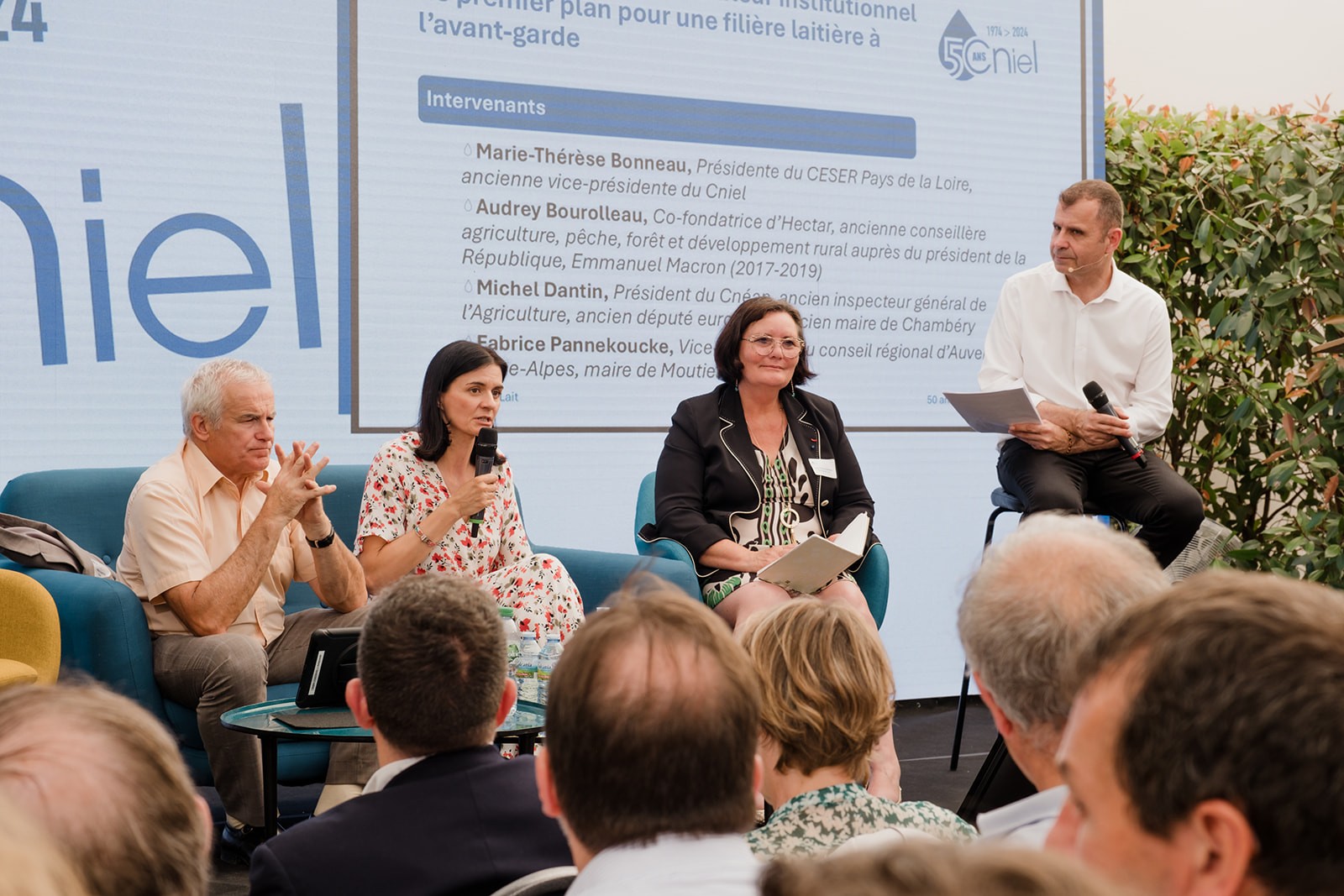 Guillaume Blanchon
Guillaume BlanchonWhat are the future prospects?
By continuing to take an active role at all levels: local, national and continental, through collaboration with public authorities and European institutions, Cniel will contribute to facing the challenges facing the dairy sector, particularly in the areas of attractiveness and ecological transition. Audrey Bourolleau, co-founder of Hectar and former advisor to President Emmanuel Macron, points out: « We often forget the S of social responsibility in CSR plans. However, Cniel has a real role to play in supporting this dimension, which is concretely reflected in the replacement service that enables farmers to take time off, the strategy for attracting talent, the support for salaried employees, or the delegation of work…. Improving the working conditions and quality of life for farmers are indeed major focuses of Cniel’s initiatives.
This social dimension is closely linked to the attractiveness of dairy professions. The sector is struggling to attract new talent due to working conditions that are often perceived as difficult, and an outdated image of the agricultural sector. To meet the challenge, Cniel is implementing a number of initiatives aimed at making the sector’s professions more attractive. « We need to be able to plan for an economic organisation that will enable us to meet societal expectations, while consolidating the assets of our farms,» summarises Audrey Bourolleau.
The ecological transition is also a priority for the dairy sector, which must adapt to growing environmental demands. The adoption of sustainable agricultural practices and the reduction of the carbon footprint of farms are at the heart of Cniel’s actions. The France Terre de Lait project, for example, promotes strong environmental commitments, including the reduction of greenhouse gas emissions and the protection of biodiversity.
Cniel has established itself as a key, visionary player in the French dairy sector, playing a central role at both national and international level. As an interface between the various actors in the sector and the public authorities, Cniel has adapted its missions to the challenges posed by a constantly changing world. Today, maintaining this positive dynamic requires ongoing cooperation with the public authorities and reinforced dialogue between all actors in the sector.
Ensuring the long-term viability of the dairy sector requires increased collaboration to successfully respond together to the challenges of sustainability, innovation and the attractiveness of our professions. By pursuing this path, Cniel can ensure a prosperous and sustainable future for the French dairy sector while remaining faithful to the core values of quality, tradition and innovation.
This social dimension is closely linked to the attractiveness of dairy professions. The sector is struggling to attract new talent due to working conditions that are often perceived as difficult, and an outdated image of the agricultural sector. To meet the challenge, Cniel is implementing a number of initiatives aimed at making the sector’s professions more attractive. « We need to be able to plan for an economic organisation that will enable us to meet societal expectations, while consolidating the assets of our farms,» summarises Audrey Bourolleau.
The ecological transition is also a priority for the dairy sector, which must adapt to growing environmental demands. The adoption of sustainable agricultural practices and the reduction of the carbon footprint of farms are at the heart of Cniel’s actions. The France Terre de Lait project, for example, promotes strong environmental commitments, including the reduction of greenhouse gas emissions and the protection of biodiversity.
Cniel has established itself as a key, visionary player in the French dairy sector, playing a central role at both national and international level. As an interface between the various actors in the sector and the public authorities, Cniel has adapted its missions to the challenges posed by a constantly changing world. Today, maintaining this positive dynamic requires ongoing cooperation with the public authorities and reinforced dialogue between all actors in the sector.
Ensuring the long-term viability of the dairy sector requires increased collaboration to successfully respond together to the challenges of sustainability, innovation and the attractiveness of our professions. By pursuing this path, Cniel can ensure a prosperous and sustainable future for the French dairy sector while remaining faithful to the core values of quality, tradition and innovation.
This article is based on a round table organised on the occasion of the Cniel General Assembly held at the Maison du Lait on 26 June, 2024. The round table was attended by:
- Marie-Thérèse Bonneau, president of CESER Pays de la Loire, former vice-president of Cniel,
- Audrey Bourolleau, co-founder of Hectar, former agriculture, fisheries, forestry and rural development advisor to French President Emmanuel Macron (2017-2019),
- Fabrice Pannekoucke, Vice-President of the Auvergne Rhône-Alpes Regional Council, Mayor of Moutiers (Savoie),
- Michel Dantin, President of Cnéap (a network of private agricultural education establishments), former Inspector General of Agriculture, former Member of the European Parliament, former Mayor of Chambéry.
undefined 19/08/2024
undefined 09/09/2024


